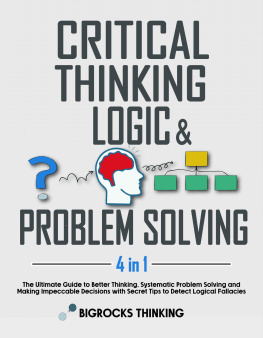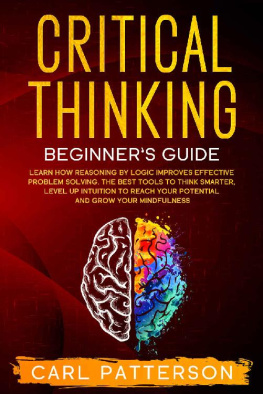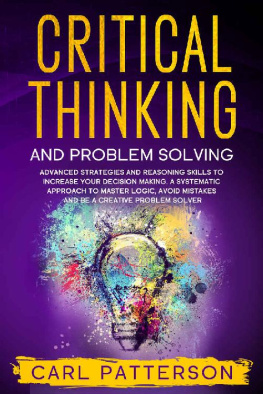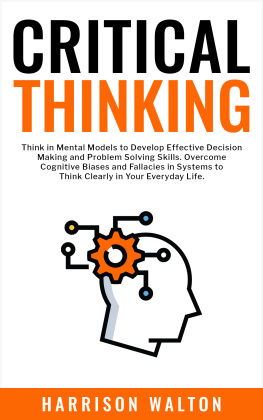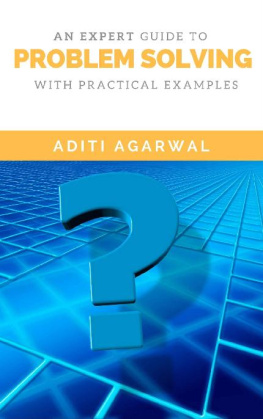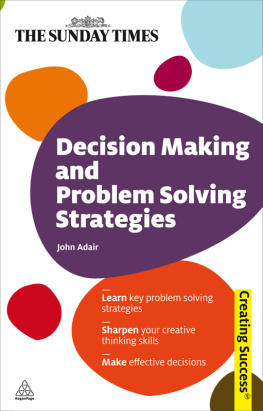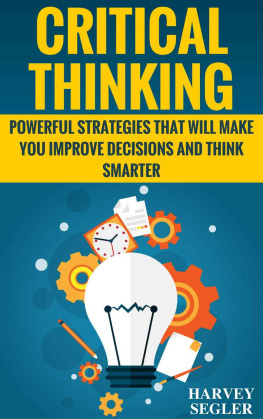Critical Thinking,
Logic &
Problem-Solving
The Ultimate Guide to Better Thinking, Systematic Problem Solving and Making Impeccable Decisions with Secret Tips to Detect Logical Fallacies
by
BIGROCKS THINKING
Empower Up
Copyright 2022 - All rights reserved.
The content contained within this book may not be reproduced, duplicated, or transmitted without direct written permission from the author or the publisher.
Under no circumstances will any blame or legal responsibility be held against the publisher, or author, for any damages, reparation, or monetary loss due to the information contained within this book, either directly or indirectly.
Legal Notice:
This book is copyright protected. It is only for personal use. You cannot amend, distribute, sell, use, quote or paraphrase any part, or the content within this book, without the consent of the author or publisher.
Disclaimer Notice:
Please note the information contained within this document is for educational and entertainment purposes only. All effort has been executed to present accurate, up-to-date, reliable, complete information. No warranties of any kind are declared or implied. Readers acknowledge that the author is not engaged in the rendering of legal, financial, medical, or professional advice. The content within this book has been derived from various sources. Please consult a licensed professional before attempting any techniques outlined in this book.
By reading this document, the reader agrees that under no circumstances is the author responsible for any losses, direct or indirect, that are incurred as a result of the use of the information contained within this document, including, but not limited to, errors, omissions, or inaccuracies.
Contents
|Part 1| Critical Thinking
Section 1: What Is Critical Thinking ?
There are numerous definitions of critical thinking from various schools of thought. The intrinsic capacity to process and interact analytically with incoming knowledge could be one. This interaction is accomplished by making observations and logically connecting disparate pieces of information. Critical thinking can also be referred as the ability to interpret information factually and reach a sound conclusion. It entails the assessment of informational materials like statistics, facts, observable phenomena, and research findings.
To solve problems or make decisions, good critical thinkers can infer acceptable conclusions from a collection of facts and distinguish between relevant and irrelevant elements.
When you use critical thinking, you analyze, interpret, evaluate, and form opinions about what you read, hear, say, or write. The Greek word kritikos , which means able to judge or distinguish, is where the word critical originates. Making trustworthy decisions based on trustworthy information is a key component of critical thinking.
Using critical thinking does not necessitate being pessimistic or fixating on flaws. It entails being able to focus your thoughts to dissect a situation or a piece of information, interpret it, and then use that interpretation to make a wise choice or judgment.
Although no one is born with a critical thinking mindset, people who continuously use it are said to have one. These are qualities that can be acquired and enhanced with use and practice. Curious and reflective individuals are critical thinkers. They delve deeper and ask more questions to learn more and look for answers. They analyze claims and arguments, distinguish between facts and opinions, and pose significant questions. They are open to questioning their views and have humility that enables them to acknowledge ignorance or a lack of understanding when necessary. Critical thinkers are flexible in their thinking. They actively enjoy learning and regard the search for new information as a lifetime endeavor, which is maybe the most important quality in a critical thinker.
You will articulate yourself more effectively, read more critically, and efficiently gather crucial information if you can think critically. You become a better thinker and problem solver with critical thinking. Critical thinking is amplified by the following three fundamental abilities:
Curiosity is the drive to find out more information, gather proof, and be receptive to novel concepts.
Skepticism entails not mindlessly trusting everything that you hear and having healthy skepticism about new information.
Humilit y i s acknowledging that your beliefs are mistaken in the face of fresh, compelling evidence to the contrary.
Critical Thinking Examples
The situations that necessitate critical thinking vary by industry. Several instances include the following:
- A triage nurse evaluates the cases at hand and determines the treatment priorities.
- A plumber assesses the materials that would be most appropriate for a job.
- An attorney examines the evidence and develops a plan to win the case or determine whether to settle outside court.
- A manager examines customer feedback forms and uses the data to create a training session for staff members on customer service.
In essence, critical thinking calls for the use of reasoning skills. Being an active learner instead of a passive taker of information is key. Critical thinkers fiercely contest ideas and presumptions rather than taking them at face value. They are always open to learning that the assumptions, reasons, and conclusions do not accurately reflect the circumstance. Critical thinkers will identify, examine, and resolve issues methodically rather than solely depending on intuition or gut feelings.
What Exactly Does It Mean to Think Critically?
Critical thinking is a means of looking at things to determine the truth in a situation. It is based on evidence, observation, and reasoning. Determining the optimal course of action requires the capacity to look at a situation from various angles. The father of contemporary critical thinking is John Dewey.
According to him, critical thinking entails active, persistent, and careful consideration of a belief or supposed form of knowledge in the light of grounds which support it and further conclusions to which it tends. Even though he wrote those remarks in 1909, the necessity for a logical approach to decision-making still exists today.
An individual with critical thinking abilities can:
- Distinguish between fact and opinion;
- Recognize the connections between concepts;
- Examine various viewpoints;
- Recognize the goals of others;
- Investigate the reasons for and against a position;
- Consider how their presumptions, ideas, and values are justified;
- Remain conscious of their thoughts;
- Analyze the significance and applicability of arguments and concepts;
- Recognize, construct, and evaluate arguments;
- Identify logical contradictions and mistakes;
- Methodically and consistently approach issues;
- Avoid jumping to conclusions too soon; and
- Adjust expectations in light of new information.
Top Things to Do Right Now to Improve Your Critical Thinking
Recognize Assumptions: Assumptions are something we all make, often without even realizing it. Consider what assumptions are pertinent to your issue, separate fact from opinion, and look for opposing stances.
Argument Evaluation: Analyze claims critically and assess them accurately and impartially. People will make arguments to persuade you to have a certain belief or behave a certain way. Watch out for persuasive techniques and your propensity to favor something due to your personal bias to assist you in assessing the truth of arguments. Watch out for strong emotions, as these might make it difficult to view an argument.

